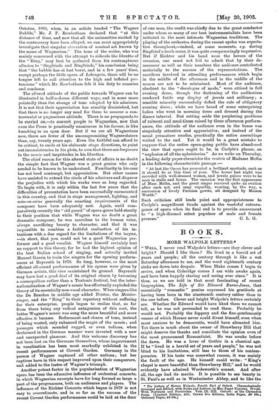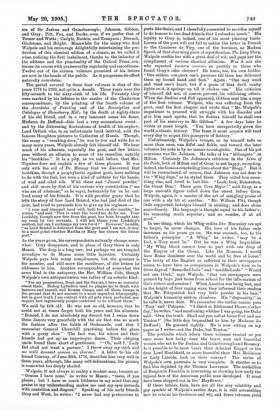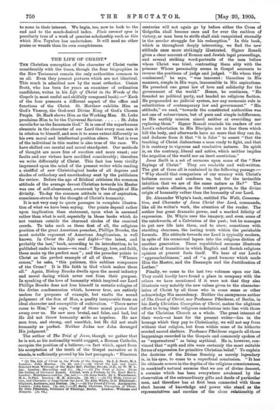BOOKS.
—4— MORE WALPOLE LETTERS.*
" WELL, I never read Walpole's letters—are they clever and bright ? Should I like them ? He lived in a horrid set of years and people; all the century through is like a wet Saturday afternoon to me, and the word eighteenth century sinks me down into despair. When Blake comes I begin to revive, and when Coleridge comes I am wide awake again, and have been happily staring and seeing ever since." It is thus, as we are told in that most fascinating of recent biographies, The Life of Sir Edward Burne-Jones, that essentially " romantic " genius expressed his gratitude at having been born in the nineteenth century rather than in the one before. Clever and bright Walpole's letters certainly are. Whether Sir Edward would have liked them we cannot tell, as he was not persuaded to read them. Probably he would not. Probably the foppery and the fine-gentlemanly veneer of which Horace never could divest himself, even when most anxious to be democratic, would have alienated him. Yet there is much about the owner of Strawberry Hill that might deserve the thanks and conciliate the opinion even of the most pronounced Romanticist. He was awake before the dawn. He was a lover of Gothic in a classical age. If he " lived in a horrid set of years and people," he was not blind to his limitations, still less to those of his contem- poraries. If his taste was somewhat rococo, it was mainly the fault of the age. He himself could write : " King's chapel is more beautiful than Strawberry Hill," and he would evidently have admired Wordsworth's sonnet. And after all, the age had its merits. It is possible to see beauty in SL Paul's as well as in Westminster Abbey, and to like the * The Letters of Horace Walpole, Fourth Earl of Orford. Chronologically Arranged and Edited, with Notes and Indices, by Yrs. Paget Toynbee. 16 vols. With Portraits and Facsimiles. Vols. IX.-V11 Oxford : at the Clarendon Press. [Limited Edition, £16; Crown Svo Edition, India Paper, £6 16s.; Ordinary Paper, 8416s.]
era of Sir Joshua and Gainsborough; Johnson, Gibbon, and Gray; Pitt, Fox, and Burke, even if we prefer that of Turner and Watts ; Carlyle, Ruskin, and Tennyson ; Gladstone, and Bright. Meanwhile for the many who find Walpole and his entourage delightfully entertaining the pro- duction of this classical edition of a classic, as we called it when noticing the first instalment, thanks to the industry of the editress and the punctuality of the Oxford Press, con- tinues its course with praiseworthy regularity and smoothness. Twelve out of the sixteen volumes promised of his letters are now in the hands of the public. As it progresses its effect naturally cumulates.
The period covered by these four volumes is that of the years 1774 to 1783, not quite a decade. These years were the fifty-seventh to the sixty-sixth of his life. Privately they
were marked by his defence in the matter of the Chatterton correspondence; by the printing of the fourth volume of the Anecdotes of Painting and of the Description and Catalogue of Strawberry Hill; by the death at eighty-three of his old friend, and in a very innocent sense his flame, Madame du Deffand—this last a very momentous event-- and by the distressing fluctuations of health of his nephew, Lord Orford, who, in an unfortunate lucid interval, sold the famous Houghton pictures to Catherine of Russia. Though, like many a "creaking door," he was to live and write for so many more years, Walpole already felt himself old. We hear much of his ailments, especially the gout, and few letters pass without an allusion to some of his remedies, notably his " bootikins." It is a pity, as we said before, that Mrs.
Toynbee does not explain a few of these phrases. It was only with the aid of Dr. Murray that we discovered that bootikins, though a prophylactic against gout, have nothing to do with the feet, but were a kind of mittens for the hands, of wool and oiled silk. With these and "James' powder," and still more by dint of his curious wiry constitution (" me who am of adamant," as he says), fortunately for us he out- lived many of his friends. It is with peculiar gusto that he tells the story of how Lord Bristol, who had just died of the gout, had tried to persuade him to give up his regimen :—
" I rose and stamped hard with both feet on the marble," he writes, "and said This is what the bootikins do for me. Your Lordship, though now free from the gout, has been brought into my room by two servants. I will not blame your Lordship's method, but can I exchange my own for it F' However," he adds, "as Lord Bristol is delivered from the gout and I am not, it may be a moot point whether Martha or Mary has chosen the better part."
As the years go on, his correspondents naturally change some- what. Gray disappears, and in place of Gray there is only Mason. The drop is a long one; but perhaps we are tempted nowadays to do Mason some little injustice. Certainly Walpole pays him many compliments, but the greatest is the number, and still more the excellence, of the letters he addresses to him. Another correspondent of somewhat the same kind is the antiquary, the Rev. William Cole, though Walpole's own antiquarianism was rather of an eclectic kind :
' "For my progenitors, Noah and the Saxons, I have no curiosity about them. Bishop Lyttelton used to plague me to death with barrows and tumuli, and Roman Camps, and all those bumps in the ground that do not amount to a most imperfect ichnography, but in good truth I am content with all arts when perfected, nor inquire how ingeniously people contrived to do without them."
We said he felt old. He was not so old, however, that he could not at times forget both his years and his ailments. "Danced, I do not absolutely say danced, but I swam down
three dances very gracefully with the air that was so much the fashion after the battle of Oudenarde, and that I remember General Churchill practising before the glass with a gouty shoe." The fact was, his nieces and their friends had got up an impromptu dance. Their obliging
uncle found them short of gentlemen. " Oh,' said I, Lady Bel shall not want a partner.' I threw away my stick and me voila dansant comme un. charme." A letter to his old friend Conway, of June 30th, 1776, describes him very well in
these years, although, like many self-delineations, the picture is somewhat too deeply shaded.
' Walpole, if not always in reality a modest man, became so.
" Genius I have none," he writes to Mason ; " taste, if you please; but I have so much littleness in my mind that any praise to my understanding makes me cast my eyes inwards with contrition and disgust" Speaking of his early friends Gray and West, he writes : "I never had any pretensions to
parts like theirs, and I cheerfully consented to sacrifice myself to do honour to two dead friends that I valued so much." His loyalty to Gray is, indeed, one of his most pleasing traits. Lovers of the poet will not fail to notice the letter in French to the Comtesse de Viry, one of the heroines, as Madam Speed, of that charming piece of mystification, The Long Story. Walpole credits her with a great deal of wit, and pays her the compliment of various classical allusions. Was it not she who repeated (Parana own-alert so prettily to those who found Gray's odes obscure? He knew, too, his own foibles. "One seldom conquers one's passions till time has delivered them up bound hand and foot." Again : " One may weed and weed one's heart, but if a grain of that devil vanity lights on it, it springs up till it chokes one." His criticism of himself did not, of course, prevent his criticising others. When the Decline and Fall appeared, Gibbon sent him a copy of the first volume. Walpole, who was suffering from the gout, read the first chapter and wrote that " Mr. Walpole's impatience to proceed will struggle with his disorder and give him such spirits that he flatters himself he shall owe part of his recovery to Mr. Gibbon." A few days later he writes at more length. "You have unexpectedly given the world a classic history. The fame it must acquire will tend every day to acquit this panegyric of flattery."
Unfortunately, Walpole's temper, as he himself tells us more than once, was fitful and fickle, and toward the later volumes his note is by no means so eulogistic. One of his pet aversions was Dr. Johnson. He talks of his " billinsgate" on Milton. Certainly Dr. Johnson's criticism in the Lives of the Poets, both of Milton and of Gray, is not happy, excepting, indeed, the famous concluding lines about the "Elegy." But it will be remembered, of course, that Johnson was not dear to the " Whig dogs," as he styled them. They called him some- thing else, and loved to bait him. "Look, look, Bonstetten, the Great Bear ! There goes Ursa Major ! " said Gray, as a large uncouth figure rolled down the street before them. Walpole, again, is a master of the art of mingling praise of one with a sly hit at another. " Mr. William Pitt, though little supported, indulges himself in shining ; and does shine marvellously. His language is thought equal to his father's ; his reasoning much superior; and no wonder, if at all good."
In one thing, which his Whig critics like Macaulay are apt to forget, he never changes. His love of his father only increases as his years go on. He was staunch, too, to his father's principles. " A Whig," he writes, " may be a fool, a Tory must be." But he was a Whig Imperialist- " My Whig blood cannot bear to part with one drop of the Empire of the Ocean. Like the Romans, I would have Rome domineer over the world and be free at home." The levity of the English as reflected in their newspapers seems to have been as conspicuous in Walpole's time as in these days of " flannelled fools " and " muddied oafs." " Would not one think," says Walpole, "that our newspapers were penned by boys just home from school for the information of their sisters and cousins ? When America was being lost, and in the height of four raging wars, they informed their readers that Mr. Fitzpatrick had very little powder in his hair." Walpole's humanity seldom slumbers. His " dogmanity," as he calls it, never does. We remember the earlier canine pets Tory ' and • Patapan.' "I dined at Richmond House, t'other day," he writes, " and mentioning whither I was going, the Duke said : ' Own the truth. Shall not you call at home first and see Tonton ? ' [the little dog bequeathed to him by Madame du Deffand]. He guessed rightly. He is now sitting on my paper as I write—not the Duke, but Tonton."
The portraits which adorn these volumes remind us yet once more how lucky were the brave men and beautiful women who sat to Sir Joshua and Gainsborough and Romney. Is it possible to be more brave than Admiral Keppel or the first Lord Heathfield, or more beautiful than Mrs. Robinson or Lady Lincoln, look on their canvas ? The series of Walpole's own portraits is very complete. It startles us to find him depicted by Sir Thomas Lawrence. The medallion of Benjamin Franklin is interesting as showing how early the typical face of the American public man developed. It must have been shipped out in the ' Mayflower.'
If these letters, then, have not all the airy 'volatility and gay sparkle of Walpole's earlier days, it is still astonishing how he retains his freshness and wit, and these volumes yield
to none in their interest. We begin, too, now to look to the end and to the much-desired index. Finis coronat opus is peculiarly true of a work of genuine scholarship such as this which Mrs. Toynbee has undertaken. It will need no other praise or wreath than its own completeness.








































 Previous page
Previous page